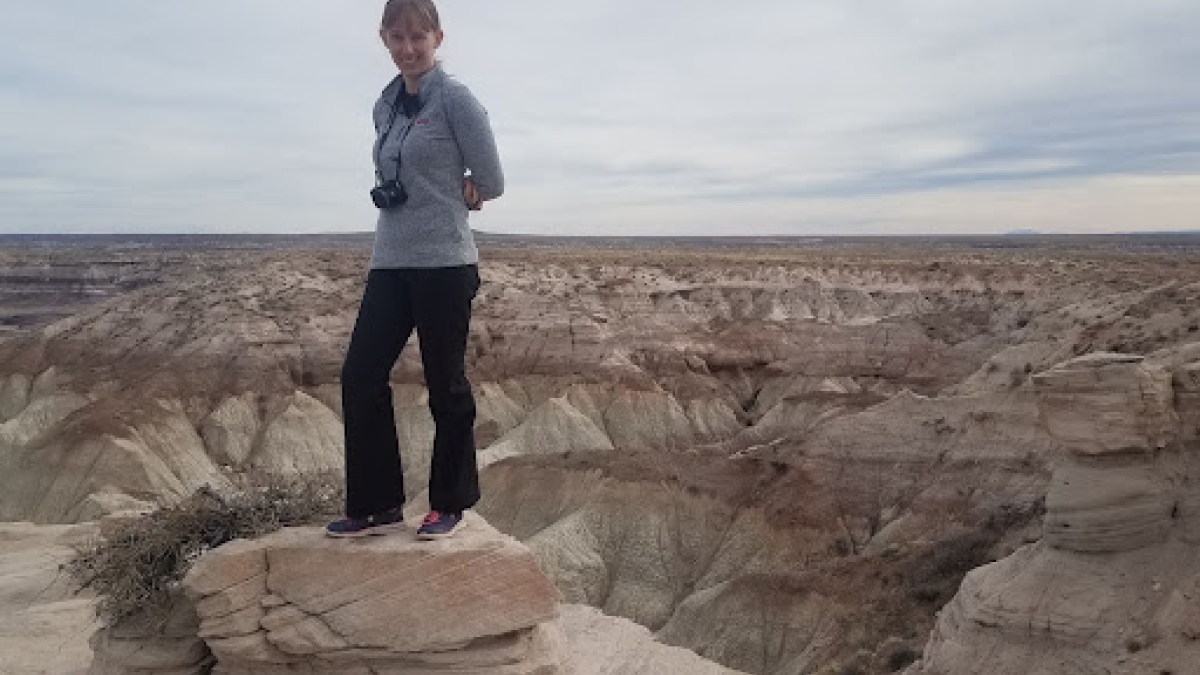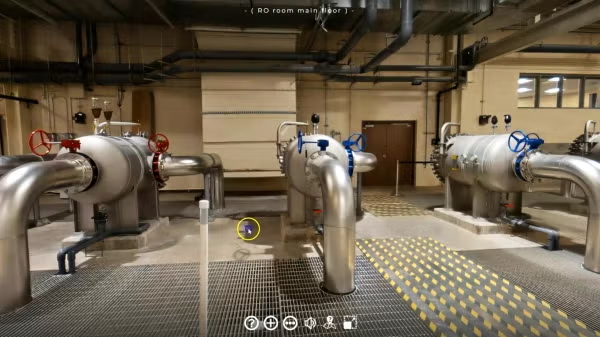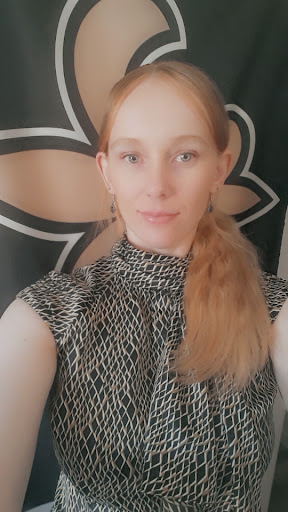Anthropology PhD graduate researches human migration in risky coastal environments

Charlotte Till at Petrified Forest National Park.
Editor’s note: This story is part of a series of profiles of notable fall 2022 graduates.
Anthropology student Charlotte Till's research focuses on human migration and how environmental changes affect migration. The international student will be graduating with a PhD this fall from the School of Human Evolution and Social Change.
“My dissertation attacks trying to understand migration decision making from a rather understudied perspective — that of domestic migration — internal movement within national borders rather than across them,” Till says.
Here, she talks about her time at ASU.
Note: Answers have been edited for length and clarity.
Question: Why did you choose ASU?
Answer: I came to the United States for graduate school thanks to a Fulbright Scholarship. As a part of that, I selected a few different universities across the U.S. that I had applied to. At that time, I wanted to study human migration through ancient DNA, and there were only a limited number of universities with those capabilities. So I applied to three, got into ASU and accepted that position. I started in the PhD program, but as a Phase I student who would undertake two years of master's-in-passing work, complete said master's work and then move right into Phase II as an actual PhD student.
Q: What was your “aha” moment when you realized you wanted to study the field you majored in?
A: There have been several of these over my life. I knew from a very young age that I wanted to study humans and culture. I also knew I had a love of science — especially biology and chemistry, which led to a love of genetics. My first “aha” would have been when I was applying for my undergraduate university where I knew I wanted to study anthropology, but still loved science so hit the ground running and started a double degree. My second “aha” moment came toward the end of my undergraduate program where I had realized that I wanted to understand human migration, and I could do this by merging my loves of anthropology and genetics through the study of ancient DNA.
When in the United States I was undertaking a summer internship at Oak Ridge National Laboratory in Tennessee, and as part of the projects I was allowed to engage with, I realized that I still had a strong passion to understand human migration and migration decision making, but that modern migration and the impact of environment was more interesting to me. It was hard to leave genetics and ancient DNA behind, but I found the connection to the environment’s role in migration to be far more intriguing. This was right at the time when global attention was starting to really focus on climate change, the IPCC reports and issues of national identity and security were becoming more "common" in the overall consciousness.
Q: What’s something you learned while at ASU — in the classroom or otherwise — that surprised you or changed your perspective?
A: So much. Starting graduate school in the U.S. as an international student was a big shock initially. The different schools of thought as far as graduate education (between the U.S. system and the British system) was something that did take me the better part of two years to really accept and get my head around. While I didn’t have a language barrier for the most part, there were other cultural barriers and expectations that I had to learn, and many were learned the hard way. However, I think the most important lesson of my grad school experience came outside of the classroom. I was in the U.S. during a very strained time — due to the political climate and due to the pandemic. During the height of these challenges was the time when almost all of the support structures that grad students expect, and in a way look forward to, were all stripped away. Isolation and working from home meant I could not easily bounce ideas off my peers. It really was a lesson in perspective of importance and self determination.
Q: Which professor taught you the most important lesson while at ASU?
A: There have been a lot of important lessons learned over my years of grad school. Some hard to take, some very rewarding. Many professors have helped my development as a graduate student, scholar and young academic over the years, from my own department and from others. However, the most important of all of them would have to be my committee chair, Associate Professor Shauna BurnSilver. The lessons were not always research or course work related, but how to navigate academia, how to think critically about a question, how to fully explore an idea before jumping in at the deep end and drawing in details.
Q: What’s the best piece of advice you’d give to those still in school?
A: College is great, but it is not for everyone. Don’t be pushed into going just because your friends are, or because your parents want you to. There are a multitude of jobs and careers out there that do not need a college degree. My boyfriend is living proof of this — he got his GED, but that was it, and now he climbs cellphone towers and deals with complex electronics and antennas to bring you the technologies that make your phone work and 9-1-1 operate. College is great if you are passionate about a subject, or want to learn more about something, the same is true for graduate education. But if that spark, if that passion, if that internal joy is not there, then it is okay to realize that. It is okay to change your mind, and it is okay to stop.
Q: Can you tell us what your dissertation was about and why your research interested you?
A: I have been fascinated with humans and with human culture for a very long time. My interest in wanting to understand migration and migration decisions came a little later, but is still rather foundational to my curiosity. I really want to know how humans make migration decisions.
My dissertation attacks trying to understand migration decision making from a rather understudied perspective — that of domestic migration — internal movement within national borders rather than across them. I focus on domestic migration, within a Global North perspective, and through an environmental lens. Importantly, my dissertation asks a very important question — what does “environment” actually mean?
My field work was conducted across the U.S. Gulf Coast, with a focus within Terrebonne Parish, Louisiana, an area that is facing risk and threat from environmental events — both fast on-set (storms, floods, hurricanes) and slower on-set (flooding, sea level rise, land subsidence, erosion, salt intrusion, water current changes, etc.), as well as more anthropogenic risks such as those seen during the Deepwater Horizon incident.
In relation to migration intention, my research importantly directly targeted those whose migration intention was not to move, but rather to remain. Within the academic literature, studies identifying non-movement as a real decision outcome, especially in areas that are facing very real impacts of climate change, are slowly becoming more numerous. A main finding of my work is not only that environment is far more broadly perceived than is currently utilized by policy literature, but that there is real power in including environmentally derived variables in migration models.
My dissertation covers a lot of other elements, but the last take away I will share is that my dissertation demonstrates that the environment does indeed play a role in migration decision making, and that unlike established literature this role is not always negative and not always as a migration driver or push factor. Rather, some environmental components, especially those identified as more social/cultural in nature, can have very real and very powerful "anchoring" forces that act to keep people in place, despite risk.
Q: What are your plans after graduating with your PhD?
A: I hope to find a job, either in research, academia or the non-profit sector so that I can continue my time in the U.S. and make the most of my “post-completion training” time I am allowed to utilize as a part of my visa/exchange program. There are some skills I would like to build to help me in future research projects.
More Environment and sustainability

2 ASU faculty elected as AAAS Fellows
Two outstanding Arizona State University faculty spanning the physical sciences, psychological sciences and science policy have…

Homes for songbirds: Protecting Lucy’s warblers in the urban desert
Each spring, tiny Lucy’s warblers, with their soft gray plumage and rusty crown, return to the Arizona desert, flitting through…

Public education project brings new water recycling process to life
A new virtual reality project developed by an interdisciplinary team at Arizona State University has earned the 2025…


